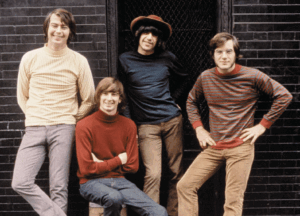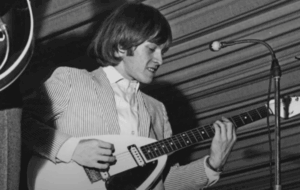The Unknown Stories Behind Phil Collins’ Life

UNITED KINGDOM - JANUARY 01: Photo of PHIL COLLINS; LONDON 1977 (Photo by Dick Barnatt/Redferns)
Whether you’re a fan or not, there’s no denying Phil Collins is one of music’s biggest names. In the 1980s alone, he scored 13 U.S. Top Ten hits and sold over 200 million records through both his solo work and as the frontman of Genesis, stepping in after Peter Gabriel left the band in 1974. Along the way, he picked up a shelf full of awards, including several Grammys and even an Academy Award.
But for all the fame and accolades, Collins’ personal life has been anything but smooth. Behind the spotlight were failed marriages, serious health struggles, and more than his fair share of public mockery. His story is a good reminder that success doesn’t make you immune to life’s challenges. In fact, it often puts them under a microscope.
Losing His Father on Christmas Day
Phil Collins faced heartbreak early in life—just as his music career was beginning. At 21, in late 1972, he was excited to reunite with family for the holidays. In his memoir Not Dead Yet, he recalls calling his dad, Greville, to make sure he’d be there. “Everything seemed fine,” Phil says, until his brother Clive delivered the devastating news: their father had suffered a heart attack.
At first, there was hope. Greville was treated at the hospital and sent home, much to the family’s relief. But things took a tragic turn. “Dad spends a restful night,” Phil writes. “But the next morning he takes a turn for the worse, and Clive takes him to hospital in nearby Southend, where he has yet another bad turn. It’s Christmas Eve. Dad dies on Christmas Day at 8 a.m.” It was really a painful loss that left a lasting mark on the young musician.
Did Genesis Come Before Family?
When Phil Collins stepped up as Genesis’ lead singer in 1975, his dedication to the band was full throttle—even at the cost of precious family moments. Just days after the birth of his first son, Simon, Collins hit the road for a two-year tour. In his memoir Not Dead Yet, he reflects, “In theory Genesis could have delayed the start of the album so I could be home for the birth without any panic or emergency dashes back over the North Sea. But this is Genesis, and the show must go on. In hindsight, I could have said, ‘F*** Genesis, I’m off to look after my wife.’ But we’re all expected to give everything to the band.”
While Collins saw it as duty, his first wife, Andrea Bertorelli, didn’t see it that way. She told the Daily Mail that fame had gone to his head and that Genesis became his top priority. “I remember feeling under pressure to give birth, because we were holding up the tour,” she said. “In the end, I had to be induced… within a day or two, Phil had left to go on the road.”
A Divorce That Refused to Stay Private
Phil Collins’ divorce from his first wife, Andrea Bertorelli, in 1980 was anything but quiet. After five years of marriage, the split left Collins heartbroken—and he didn’t hide it. He famously claimed Andrea had run off with a decorator, and even took a public jab during a Top of the Pops performance by placing a paint bucket and brush on stage while singing “In the Air Tonight.”
In a Playboy interview, Collins defended putting his pain into his music: “People ask me, ‘Aren’t you embarrassed? You’re putting your private life out for all the world to see.’ It’s like I oughtn’t to let people see that I was hurt, that I cry, that I do unmanly things. But I’m not embarrassed by it.”
For decades, Bertorelli stayed silent—until 2015, when she finally shared her side. She revealed that both had cheated, and his frequent absences and anger strained their relationship. A year later, she sued Collins over claims in his memoir Not Dead Yet, saying she could no longer stay quiet while he pushed what she called a false version of their story.
Three Marriages, Three Heartbreaks
Phil Collins didn’t have much luck when it came to marriage. His second marriage, to Jill Tavelman, ended in 1996 after he admitted to having an affair. Although they tried to patch things up, love had already faded. Being on tour constantly only made things worse. Hoping to explain his feelings, Collins wrote her a long letter—but faxed it. Unfortunately, the media caught wind and twisted the story into a headline-grabbing scandal about him dumping his wife by fax, which hurt him deeply, as that wasn’t his intent.
In 1999, he married Orianne Cevey and had two sons. But after their second child was born, Orianne struggled with post-natal depression, leading to tension and emotional distance. They divorced in 2006, a painful split especially for Collins’ daughter, Lily, who saw Orianne as a second mother.
Reflecting on his marriages in Not Dead Yet, Collins wrote, “I am disappointed that I have been married three times. I’m even more disappointed that I have been divorced three times.” He added, “while three divorces might seem to suggest a casual attitude toward the whole idea of marriage, this couldn’t be further from the truth. I’m a romantic who believes, hopes that the union of marriage is something to cherish and last.”
When It Became Cool to Hate on Phil Collins
Even when Phil Collins was topping charts in the mid-80s, the criticism never seemed to let up. In an interview with Playboy, he admitted how much it stung: “I think a lot of critics saw the fans who show up for my concerts, these screaming girls in the audience, and just didn’t understand it. I didn’t ask for it, but it ends up with me getting all this ‘short, slightly bald, overweight, middle-aged pop star’ kind of thing. And it does hurt.”
Over time, the jabs got meaner. Critic Julie Burchill reportedly called him “the ugliest man since George Orwell.” Even fellow musicians took shots—David Bowie referred to his 1980s creative slump as his “Phil Collins years,” and Paul McCartney once called him “little Phil.” Oasis guitarist Noel Gallagher accused him of becoming a tax exile for moving to Switzerland with his Swiss-born wife.
To top it off, South Park gave Collins the full parody treatment, but in fairness, they’ve roasted just about everyone. Still, the mockery took its toll.
The Injury That Took Phil Collins Off the Drums
Phil Collins has faced more than his fair share of health challenges, but the one that hit hardest affected the very thing he’s best known for—his ability to play. In 2000, he suffered an aural stroke caused by an ear infection, leaving him 50% deaf in one ear. He brushed it off and kept going, but it turned out to be just the beginning of more serious issues.
During the 2007 Genesis reunion tour, Collins dislocated vertebrae in his neck. Though surgery was successful, the nerve damage lingered. His hands no longer worked properly, which meant no more drumming or playing piano. In an official statement to the UK press, Collins remained hopeful: “Maybe in a year or so it will change, but for now it is impossible for me to play drums or piano. I am not in any ‘distressed’ state, stuff happens in life.”
Despite the setback, his attitude stayed grounded. Still, for a musician who lived behind a drum kit, the loss was tough.
Phil Collins Faced Thoughts of Ending It All
After years of health problems, public ridicule, and personal heartbreak, Phil Collins hit a point where life felt unbearably heavy. In a candid interview with Rolling Stone, he admitted that by 2010, things had gotten so bleak, he seriously considered suicide. He could no longer play the drums, his attempt to shift into Broadway wasn’t taking off, and his third marriage had ended in divorce. Everything he had once built seemed to be falling apart.
In his memoir, Collins wrote, “I sometimes think I’m going to write this Phil Collins character out of the story. Phil Collins will just disappear or be murdered in some hotel bedroom, and people will say, ‘What happened to Phil?’ And the answer will be, ‘He got murdered, but, yeah, anyway, let’s carry on.’ That kind of thing.”
He added, “I wouldn’t blow my head off. I’d overdose or do something that didn’t hurt. But I wouldn’t do that to the children.” Quoting a comedian’s suicide note, he said, “Too many things went wrong too often. I often think about that.”
Why Phil Collins Stepped Away from the Spotlight
By 2011, Phil Collins had reached a point where his health and outlook made continuing in the music industry feel impossible. No longer able to play the drums or piano, and feeling disconnected from the changing landscape of pop music, he announced his retirement. His contract with Atlantic Records had ended, and with no close ties to the new execs, he saw little reason to stay.
Instead, Collins shifted his focus to family. He found comfort in a slower pace—picking up his youngest kids from school, spending weekends and holidays with them, and embracing the kind of day-to-day life he’d missed during years of nonstop touring.
Still, stepping away wasn’t easy. In an interview with FHM (via The Telegraph), he said, “I look at the MTV Music Awards and I think: ‘I can’t be in the same business as this.’ I don’t really belong to that world and I don’t think anyone’s going to miss me. I’m much happier just to write myself out of the script entirely. I’ll go on a mysterious biking holiday and never return. That would be a great way to end the story, wouldn’t it?”
Phil Collins’ Struggle with Alcohol After Retirement
After stepping away from the spotlight, Phil Collins found himself with too much time and not enough purpose. While he was still seeing his sons, Nicholas and Matthew, regularly at first, things took a turn in May 2012 when his ex-wife, Orianne Cevey, moved to the U.S. with her new husband—and took the kids with her. Left alone and heartbroken, Collins began drinking more heavily to fill the void.
Looking back on that dark chapter, he wrote in his memoir, Not Dead Yet, “It took me till the age of fifty-five to become an alcoholic. I got through the heady sixties, the trippy seventies, the imperial eighties, the emotional nineties. I was retired, content, and then I fell. Because suddenly, I had too much time on my hands. The huge hole, the void, left by my kids being taken away from me, again, I had to fill somehow. And I filled it with booze. And it nearly killed me. I’m one of the lucky ones.”
Collins nearly died from acute pancreatitis caused by his drinking—but thankfully, it was the wake-up call he needed to stop for good.
Back Surgery, a Broken Foot, and a Comeback
In true Phil Collins fashion, retirement didn’t last forever. He made a comeback in 2015, even though his health was far from perfect. Having moved to Miami to be closer to his sons, Collins was in a much better headspace—but his body had other plans. One morning, he woke up unable to move his foot. After getting checked out, he told Rolling Stone, “I had an MRI and my back and hips were just shot. The doctor had to go in there, work on the sciatic nerve and take my back apart and unscramble the mess.”
To make matters worse, he also broke a bone in his foot around the same time, which meant using a walking stick to get around. Still, despite the setbacks, Collins remained upbeat. “No matter what happens, I can go out there, play piano and sing,” he said. “I’m just in a very happy place right now.” Even with the pain, his love for music—and his family—kept him going.
Phil Collins Keeps Going, Even as His Health Declines
Despite his determination and love for performing, Phil Collins’ health issues have continued to follow him since coming out of retirement. Over the years, he’s often had to perform while seated due to mobility struggles. In 2017, he suffered a nasty fall in his hotel room, hitting his head on a chair and needing stitches near his eye. Thankfully, he recovered well, but the injury did force him to cancel a few shows.
Then in 2019, Collins gave fans another scare when he took a tumble on stage. According to The Charlotte Observer, he had just sat down on a chair when it tipped over, sending him to the floor. Luckily, a few quick-moving roadies helped him up, and like a true pro, he finished the show. In fact, he moved around the stage afterward without any visible trouble, proving he still had plenty of grit. Though his body may be slowing down, Collins’ spirit continues to power through.
Phil Collins and Orianne Cevey’s $20 Million Legal Showdown
At first, it seemed like Phil Collins and Orianne Cevey were headed for a happy reunion when they got back together in 2015. But things quickly unraveled again—this time with a messy twist. Cevey left Collins to marry another man but continued living in Collins’ $40 million Miami mansion with her new husband. It took four months of legal battles to finally get them out.
During the dispute, Cevey even sold some of Collins’ music awards and gold records, which deeply upset his son Simon. He told The Daily Mail, “I really feel for my Dad. It’s just a low thing to do. I don’t understand why [Orianne] would do that. Some things are priceless and should not be sold — tokens of your life achievements are certainly one of them.”
The drama didn’t stop there. Cevey filed a $20 million lawsuit claiming Collins promised her half the mansion’s sale if she moved back in. But in August 2022, a Miami judge dismissed the claim. Judge Alan Fine declared, “I’m done with this,” and “I feel comfortable saying enough is enough,” noting Cevey had violated court orders 10 times.



















